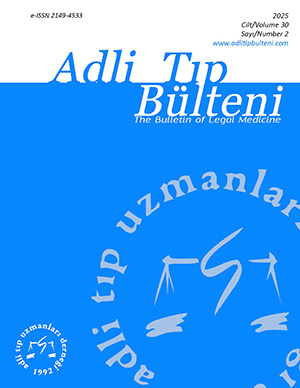Adaptation of the eyewitness metamemory scale into Turkish: a validity and reliability study
DOI:
https://doi.org/10.17986/blm.1742Keywords:
Eyewitness memory, metamemory, memory, scale adaptationAbstract
Objective: This study aims to adapt the Eyewitness Testimony Metamemory Scale into the Turkish language and to assess its validity and reliability for use in Turkish-speaking communities. The scale was developed to measure individuals’ awareness of their memory capacity for eyewitness accounts.
Methods: The study recruited 201 participants. Statistical methods including exploratory factor analysis and confirmatory factor analysis were used to assess the construct validity of the scale. Cronbach alpha coefficient was calculated to assess the reliability of the scale. The original Eyewitness Metamemory Scale was translated into Turkish and culturally adapted following rigorous methodological guidelines.
Results: Exploratory and confirmatory factor analyses revealed that the construct validity of the scale was robust. In addition, Cronbach’s alpha coefficient showed that the scale had a high level of internal consistency. These results support that the Turkish version of the Eyewitness Metamemory Scale is a psychometrically reliable and valid measurement tool.
Conclusion: The Turkish Eyewitness Metamemory Scale has been evaluated as an appropriate and reliable tool for assessing individuals’ memory awareness in eyewitnessing contexts in Turkey. This scale provides an important tool for both research and practical applications.
References
Hervé HF, Cooper BS, Yuille JC. Biopsychosocial perspectives on memory variability in eyewitnesses. In: Cooper BS, Griesel D, Ternes M, editors. Applied issues in investigative interviewing, eyewitness memory, and credibility assessment. Springer; 2013;23-40.
Wixted JT, Mickes L, Fisher RP. Rethinking the reliability of eyewitness memory. Perspect Psychol Sci. 2018;13(3):324-35. https://doi.org/10.1177/1745691617734878
Dunlosky J, Bjork RA. The integrated nature of metamemory and memory. In: Dunlosky J, Bjork RA, editors. Handbook of metamemory and memory. New York: Psychology Press; 2008:11-28.
Flavell JH. Metacognition and cognitive monitoring: a new area of cognitive-developmental inquiry. Am Psychol. 1979;34(10).
Saraiva RB. The role of metamemory in eyewitness testimony. 2020.
Wixted JT. Time to exonerate eyewitness memory. Forensic Sci Int. 2018;292:e13-e15. https://doi.org/10.1016/j.forsciint.2018.08.018
Loftus EF. Eyewitness testimony: psychological research and legal thought. Crime Justice. 1981;3.
Alpar G, Er N, Uçar Boyraz F. Görgü tanıklığında bellek hataları: olay sonrası bilginin ve tuzak soruların hatırlama ve kaynak izleme üzerindeki etkisi. Türk Psikoloji Yazıları. 2007;10(20):1-17.
Tekin S. Görgü tanıklığı: olay sonrası yanlış bilgide kategori faktörünün etkisi. Yüksek Lisans Tezi, İstanbul Üniversitesi Adli Tıp Enstitüsü; 2009.
Saraiva RB, van Boeijen I, Hope L, Horselenberg R, Sauerland M, van Koppen PJ. Eyewitness metamemory predicts identification performance in biased and unbiased line-ups. Legal Criminol Psychol. 2020;25(2):111-32. https://doi:10.1111/lcrp.12165
Seyrekbasan A. Kadınlarda görgü tanıklığı bellek hataları: tanık olunan olay sonrası bağımsız bellek bildiriminin sürpriz tanıma testi ile ilişkisi [yüksek lisans tezi]. Ankara: Hacettepe Üniversitesi; 2014.
Hollins TJ, Weber N. Monitoring and regulation of accuracy in eyewitness memory: Time to get some control. In: Dunlosky J, Bjork RA, editors. The Oxford handbook of metamemory. Oxford: Oxford University Press; 2016:171-195.
Kurdoğlu Ersoy P. Görgü tanığı belleği araştırmaları ve yasal uygulamalar: tarihsel bir bakış. Yaşam Becerileri Psikoloji Dergisi. 2018;2(4):271-9. https://doi.org/10.31461/ybpd.472700
Saraiva RB, van Boeijen IM, Hope L, Horselenberg R, Sauerland M, van Koppen P. Development and validation of the eyewitness metamemory scale. 2019. https://doi.org/10.31234/osf.io/mjfea
Brislin RW, Freimanis C. Back-translation. An Encyclopaedia of Translation: Chinese-English, English-Chinese. 2001:22.
Hu LT, Bentler PM. Cutoff criteria for fit indexes in covariance structure analysis: Conventional criteria versus new alternatives. Struct Equ Model Multidiscip J. 1999;6(1):1-55. https://doi.org/10.1080/10705519909540118
Kline TJ. Psychological testing: A practical approach to design and evaluation. Sage Publications; 2005.
Bentler PM. Comparative fit indexes in structural models. Psychol Bull. 1990;107(2):238-46. https://doi.org/10.1037/0033-2909.107.2.238
Metcalfe J, Dunlosky J. Metamemory. In: Roediger HL III, editor. Learning and Memory: A Comprehensive Reference. Vol. 2. Oxford: Elsevier; 2008. p. 349-62.
Shapira AA, Pansky A. Cognitive and metacognitive determinants of eyewitness memory accuracy over time. Metacognition Learn. 2019;14:437-61. https://doi:10.1007/s11409-019-09206-7
Göz İ, Tekin S, Dinn AA. Görgü tanıklığında olay sonrası yanlış bilginin etkisi kategori kuvvetine göre değişir mi? Türk Psikoloji Dergisi. 2015;30(75):36.
Downloads
Published
Issue
Section
License
Copyright (c) 2025 Aylin Aydın

This work is licensed under a Creative Commons Attribution 4.0 International License.
The Journal and content of this website is licensed under the terms of the Creative Commons Attribution (CC BY) License. The Creative Commons Attribution License (CC BY) allows users to copy, distribute and transmit an article, adapt the article and make commercial use of the article. The CC BY license permits commercial and non-commercial re-use of an open access article, as long as the author is properly attributed.

